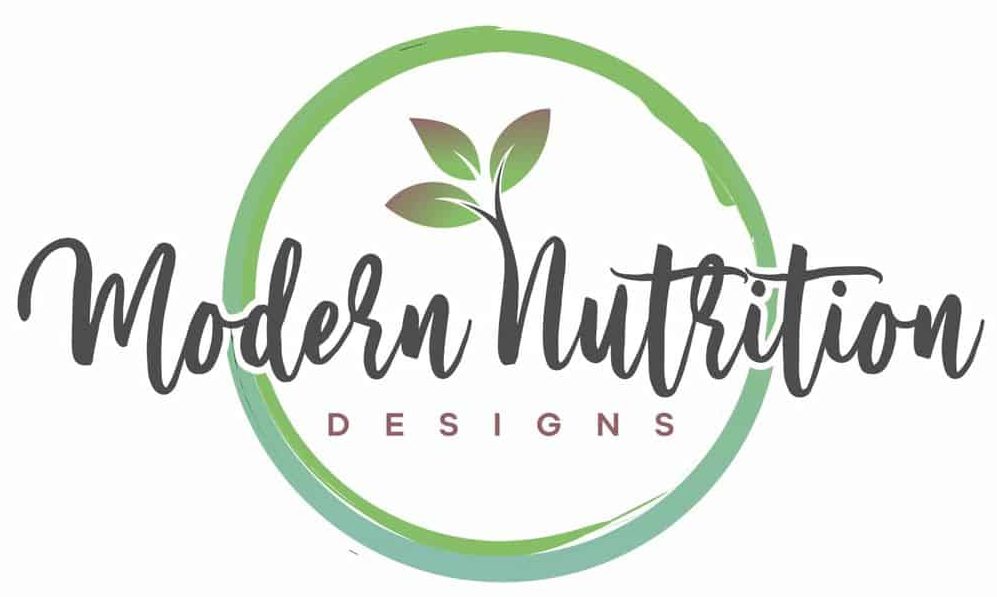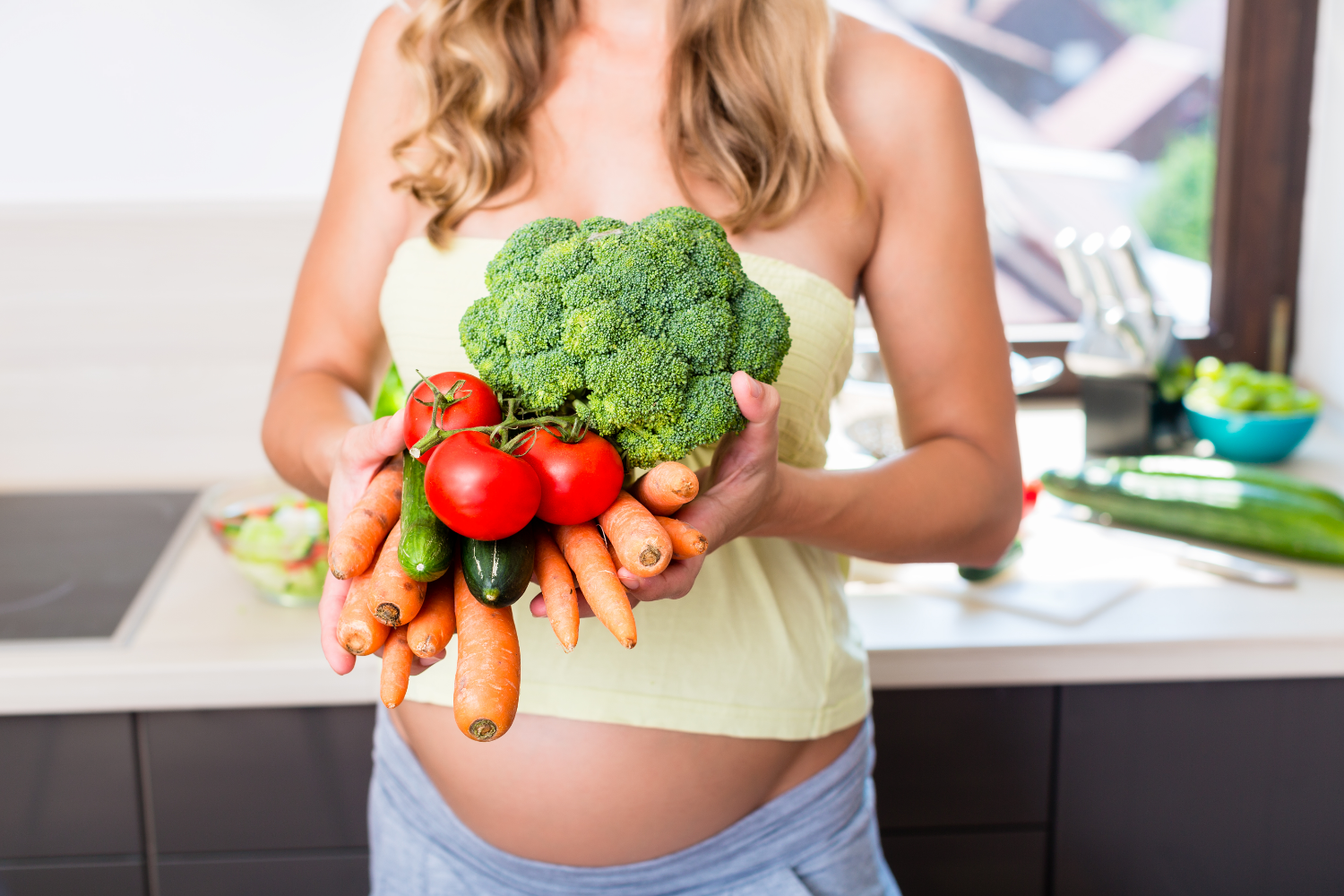A woman’s diet becomes more important during gestation than at any other time in her life. I had been embracing the plant-based lifestyle for three years prior to my pregnancy. I knew it was the right diet for me but was it the right diet for the new life growing inside of me? In this article, I will share what I have learned from my research and personal experience with a healthy plant-based pregnancy.
A balanced whole-food plant-based diet meets all the nutrient requirements for you & your developing baby. Many doctors and pediatricians are encouraging plant-based eating during gestation and beyond due to its many health benefits. Foods such as rice, beans, & leafy greens will provide the necessary building materials for growth & development.
In this article we will discuss the following topics:
- Insider tips for eating a well balanced plant-based diet while pregnant
- How to battle cravings with plant-based alternatives
- Finding plant-based foods that keep you feeling full
- Overcoming morning sickness with plant foods
- Major benefits of a plant-based pregnancy
- Debunking popular myths about eating plant-based during pregnancy
- Major essential nutrients required daily by plant-based moms-to-be
- Supplementation to consider during pregnancy while eating plant-based
Insider tips for eating a well balanced plant-based diet while pregnant
How to battle cravings with plant-based alternatives
As a dietetic and nutrition student, I decided early on in my pregnancy that I wasn’t going to give in to every little craving for less than optimal food. The first trimester was my most challenging with refraining from junk food. But as I further educated myself on the importance of providing my baby with a diet high in nutrient density, I was able to stay focused on consuming mostly whole plant-based foods.
I also read that plant-based eating would keep my cravings for junk food at bay. And it did! The more healthy foods I ate, the less distracted I was by my cravings for junk food. They became much less intense, as well as less frequent.
Your taste buds (and your brain) tend to crave whatever high-calorie food you have consumed most recently, according to evolutionary psychologist, Dr. Doug Lisle, and Dr. Alan Goldhamer in their book, The Pleasure Trap.
The authors explain how it takes 30-90 days to reset your taste buds completely. The first 3-4 days are the most challenging, however, because that is when the cravings are most intense.
I was able to test this theory during my pregnancy and I found it to be very accurate time and again after each transgression with a candy bar or vegan cookie-cake. Knowing that I only had 3-4 days of cravings to overcome allowed me to refrain from bingeing on a particular food each time I felt I HAD TO HAVE IT.
Finding plant-based foods that keep you feeling full
Another challenge I was able to overcome was finding the right foods to keep me satisfied for extended periods of time. It was really hard to get anything done when I was constantly browsing through the kitchen pantry. My appetite was ravenous!
I made it a point to include plenty of beans and starches into each of my meals. For example, I would have basmati rice with kidney beans, sweet potatoes with black beans, jasmine rice with edamame, or perhaps oatmeal with some mashed cannellini beans for breakfast.
These foods tend to break down more slowly to provide longer-lasting satiety, or feelings of fullness. I would include plenty of veggies, fruits, nuts, and seeds as well to ensure I was ingesting adequate nutrients from my diet.
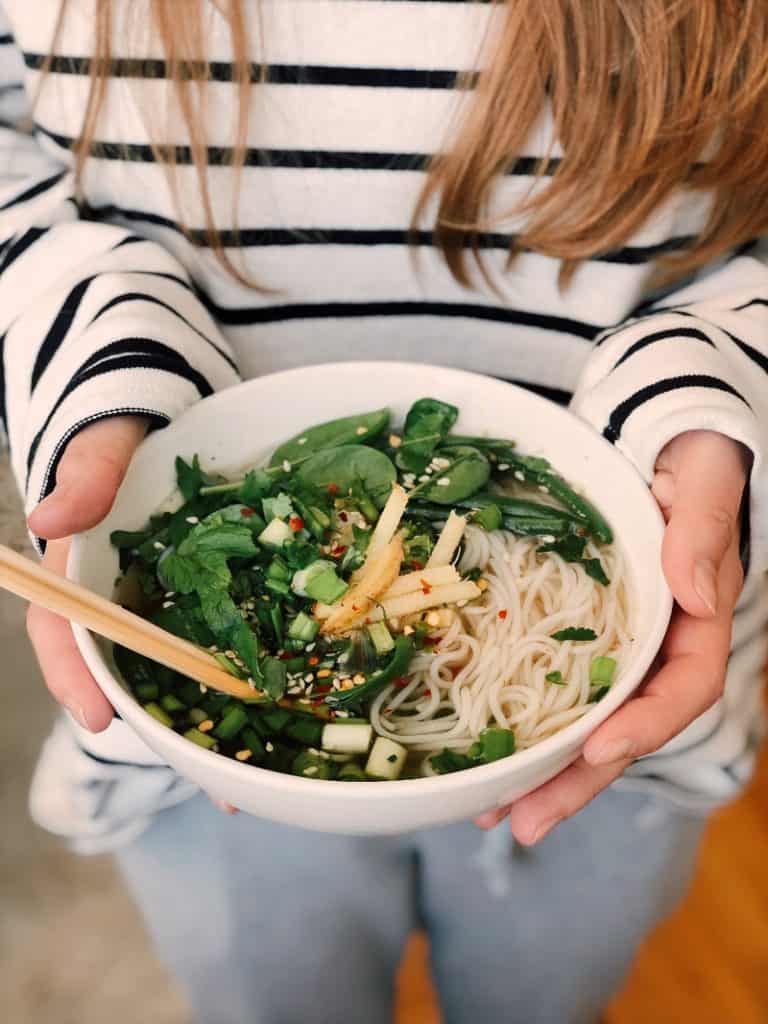
Overcoming morning sickness with plant foods
The first trimester is notoriously the worst in terms of morning sickness. I was no exception to this rule. With a little experimenting, however, I was quickly able to overcome and move past these episodes.
At the beginning of my pregnancy, I admit I became a little lax with my diligent, whole-foods plant-based diet. I was embracing the “eating for two” misconception. Initially, I was also using the outdated rationale of “if I’m craving something, my body must NEED it.”
WRONG! Pregnant women crave high-calorie junk food just like everyone else. It is simply part of our biology. We are programmed to seek out the most calorie-dense foods while expending the least amount of effort. A.K.A. the Western diet.
Before the end of my first trimester, I was able to re-establish my dietary goals by cutting out the vegan junk food. Soon, my morning sickness had completely disappeared.
It was easy to refrain from the processed convenience foods when I realized that every time I relapsed, my queasiness would return. In a way, morning sickness was a great motivator to keep me on track with my diet. The rest of my pregnancy was completely smooth.
Specific foods that seemed to help ease the early episodes of morning sickness were ginger, turmeric, and lemon water. Although this was not always a reliable strategy.
What seemed to work best was having a steady balance of healthy foods. I recommend sticking with the major plant-based food groups: legumes, grains, veggies, fruit, nuts, and seeds.
Major benefits of a plant-based pregnancy
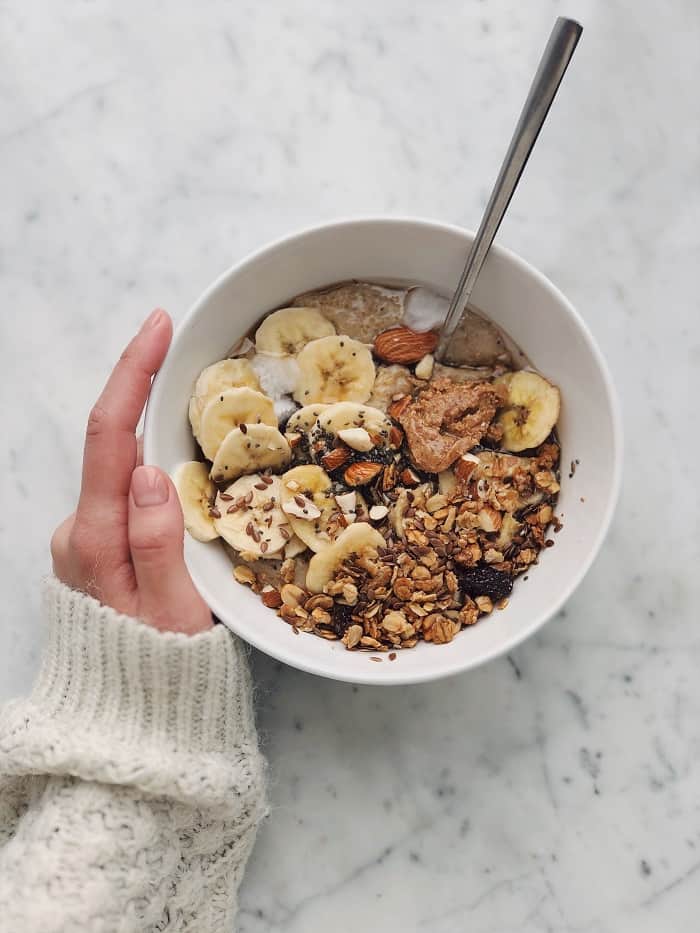
Pregnancy is a total game-changer. All your decisions become so much more meaningful. They must suddenly be carried out with careful consideration. Your diet is no exception.
I found the following words from Dr. Neal Barnard to be most reassuring when determining whether to stay plant-based during my pregnancy:
“Being vegan while pregnant is the healthiest thing you can do for you and your baby.”
Dr. Barnard explains how there are significantly fewer complications during pregnancy when the mother eats a plant-based diet. A vegan pregnancy has also been shown to turn morning sickness on and off depending on whether or not you are sticking to the diet.
The NIH confers with Dr. Barnard stating that, “balanced plant-based diets rich in fibers and low in fat are considered to be protective against poor pregnancy outcomes such as preeclampsia, gestational diabetes, and preterm delivery.”
Another benefit ensures your baby will have a taste for healthy foods outside of the womb due to your plant-based intake during gestation. You will be setting him or her up for success from the very beginning. That means no stressing over future power-struggles with getting your child to eat their broccoli!
There are also major protective aspects to refraining from animal products during pregnancy. “Several studies showed that meat intake during pregnancy exposes the mother and the fetus to polycyclic aromatic hydrocarbons associated with fetal growth retardation.
Furthermore, meat intake during pregnancy is associated with several adverse health outcomes for infants and children including developing brain tumors, allergies, rhinoconjuctivitis, and eczema, and childhood obesity according to the NIH. Watch the video below by Dr. Greger to learn more on this topic. It’s interesting stuff!
Debunking popular myths about eating plant-based during pregnancy
- Plant-based diets are deficient in protein. FALSE! All whole plant foods have protein, even broccoli. If you’re interested in more information about this topic, click here to visit my post Can Vegans get Enough Protein from Their Diet? How to Tell.
- Plant-based diets are deficient in minerals such as iron and calcium. Again, FALSE! Where do you think the cows get their minerals? From plants! In fact, there are plenty of plant foods that have more calcium and iron than meat and dairy sources.
- Carbohydrates will make you fat. FALSE! As long as you stick with whole foods for the majority of your carbs it is very difficult to eat enough of them to gain weight. This is mostly due to the high fiber and water content typical of unprocessed carbohydrates.
- Plant-based pregnant women need folic acid. Yep, FALSE! Nobody requires “folic acid“. What our bodies truly need is folate, which is abundant in green leafy vegetables, beans, and other plant foods. Folic acid is simply the synthetic (man-made) version of folate and has been shown to significantly increase breast cancer risk in women.
- Plant-based pregnancies result in low birth weights. FALSE! The Physician’s Committee for Responsible Medicine explains, “pregnancy outcomes, such as birth weight and pregnancy duration, are similar between vegetarian and nonvegetarian mothers.”
- Eating soy will cause hormonal complications for you and your baby. FALSE! The phytoestrogens are actually protective against excess estrogens in the body for men and women at all stages of life.
Major essential nutrients required daily by plant-based moms-to-be
The following table shows the daily recommended dietary allowances for pregnant and lactating women.
| Nutrient | Non-Pregnant | Pregnant | Lactating |
| Vitamin A (µg/d) | 700 | 770 | 1300 |
| Vitamin D (µg/d) | 5 | 15 | 15 |
| Vitamin E (mg/d) | 15 | 15 | 19 |
| Vitamin K (µg/day) | 90 | 90 | 90 |
| Folate (µg/d) | 400 | 600 | 500 |
| Niacin (mg/d) | 14 | 18 | 17 |
| Riboflavin (mg/d) | 1.1 | 1.4 | 1.6 |
| Thiamin (mg/d) | 1.1 | 1.4 | 1.4 |
| Vitamin B6 (mg/d) | 1.3 | 1.9 | 2 |
| Vitamin B12 (µg/d) | 2.4 | 2.6 | 2.8 |
| Vitamin C (mg/d) | 75 | 85 | 120 |
| Calcium (mg/d) | 1,000 | 1,000 | 1,000 |
| Iron (mg/d) | 18 | 27 | 9 |
| Phosphorus (mg/d) | 700 | 700 | 700 |
| Selenium (µg/d) | 55 | 60 | 70 |
| Zinc (mg/d) | 8 | 11 | 12 |
Data from Otten JJ, Pitzi Hellwig J, Meyers LD, Editors. Dietary reference intakes. The essential guide to nutrient requirements. Washington, DC: National Academies Press; 2006.
Pregnant women also need approximately 60-70 grams of protein per day, instead of the standard 46 grams recommended daily for nonpregnant women. This is easily achieved by eating plenty of whole plant-based foods, such as beans, whole grains, soy, nuts, and seeds.
For more on vegan or plant-based protein requirements click here to view my earlier post titled Can Vegans get Enough Protein from Their Diet? How to Tell.
Supplementation to consider during pregnancy while eating plant-based
- DHA 200 mg/day
- Vitamin D3 5000 IU
- Vitamin B12 1000 micrograms/day
- Iron (Not always necessary. Ask your doc for specific dosage)
Most of your dietary needs should come from whole plant foods. See some examples below:
- Protein sources: lentils, beans, nuts, seeds, quinoa, soy, veggies, and whole grains
- Calcium sources: green leafy vegetables, figs, sunflower seeds, beans, tahini, tempeh, tofu, almonds
- Vitamin D sources: the sun, fortified foods
- Iron sources: beans, dark green vegetables, dried fruits, blackstrap molasses, potatoes, nuts and seeds, and whole-grain or fortified breads and cereals
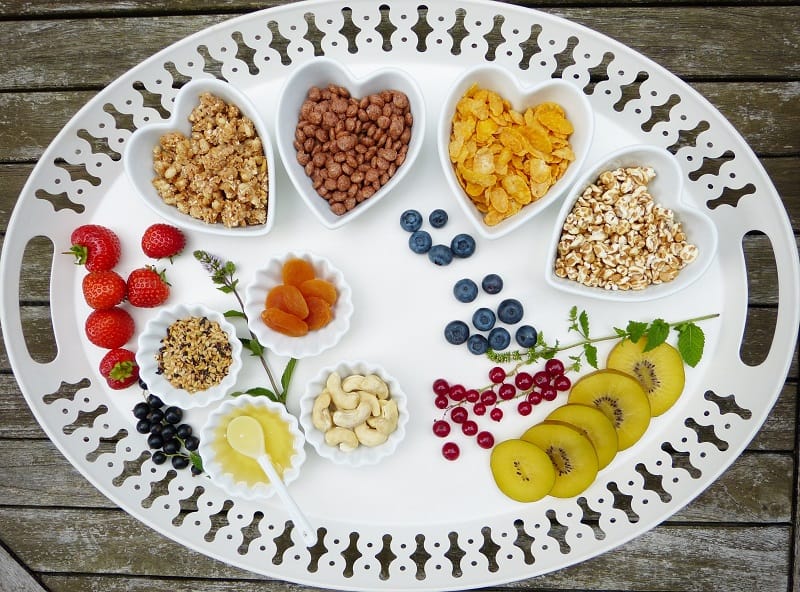
Major highlights on plant-based pregnancy
- Consuming a balanced vegan or plant-based diet is shown to be a safe and healthy alternative to the typical Western diet during gestation.
- You can meet all of your increased daily recommended intakes of essential nutrients by following a whole-food plant-based diet.
- Eating an unprocessed diet high in nutrients and low in saturated fats during pregnancy can help reduce cravings, keep you feeling full longer, and reduce morning sickness.
- Be sure to take adequate supplementation of B12, DHA, D3, and potentially iron.
- Speak with your doctor about your plans for going plant-based during pregnancy.
Karli Jackson
